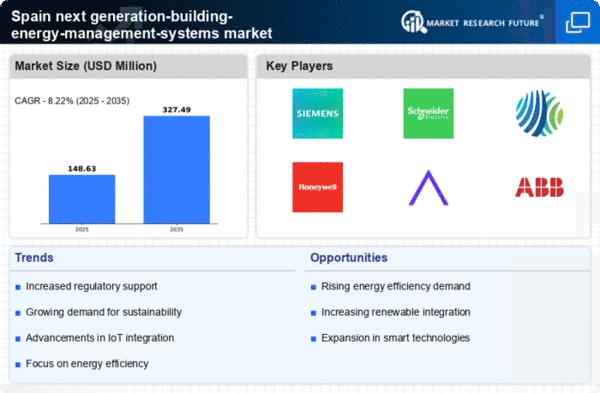Rising Energy Costs
The escalating energy costs in Spain are driving the demand for next generation-building-energy-management-systems. With energy prices rising by nearly 20% over the past two years, businesses and homeowners are seeking effective solutions to mitigate these expenses. The implementation of advanced energy management systems can lead to significant reductions in energy consumption, potentially lowering bills by 25% or more. This financial incentive is compelling organizations to invest in technologies that provide better visibility and control over energy usage. Consequently, the market is likely to expand as more entities recognize the long-term savings associated with these systems. The urgency to address rising energy costs is thus a critical driver for the next generation-building-energy-management-systems market in Spain.
Integration of Renewable Energy Sources
The integration of renewable energy sources into the energy mix is a crucial driver for the next generation-building-energy-management-systems market in Spain. With the country aiming to achieve 74% of its electricity generation from renewable sources by 2030, there is an increasing need for sophisticated energy management systems that can effectively manage these variable energy inputs. Advanced systems enable buildings to optimize energy usage by balancing demand with renewable supply, thus enhancing overall energy efficiency. This capability is particularly vital as Spain continues to expand its solar and wind energy infrastructure. The potential for improved energy resilience and reduced reliance on fossil fuels positions the next generation-building-energy-management-systems market as a key player in Spain's transition to a sustainable energy future.
Increased Awareness of Environmental Impact
There is a growing awareness of the environmental impact of energy consumption among consumers and businesses in Spain, which is propelling the next generation-building-energy-management-systems market. As climate change concerns escalate, organizations are increasingly prioritizing sustainability in their operations. This shift is reflected in the rising demand for energy management systems that facilitate carbon footprint reduction. Studies indicate that implementing these systems can lead to a decrease in greenhouse gas emissions by up to 40%. Consequently, companies are investing in technologies that not only enhance energy efficiency but also contribute to their corporate social responsibility goals. This heightened environmental consciousness is thus a significant driver for the next generation-building-energy-management-systems market.
Government Initiatives for Energy Efficiency
Government initiatives aimed at promoting energy efficiency are significantly influencing the next generation-building-energy-management-systems market in Spain. The Spanish government has set ambitious targets to reduce energy consumption by 30% by 2030, which aligns with the European Union's broader sustainability goals. To support these objectives, various funding programs and incentives are being introduced, encouraging businesses to adopt energy-efficient technologies. For instance, grants and tax rebates for implementing advanced energy management systems are becoming more prevalent. This regulatory support not only fosters innovation but also stimulates market growth, as organizations are motivated to comply with energy efficiency standards. The proactive stance of the government is thus a pivotal driver for the next generation-building-energy-management-systems market.
Technological Advancements in Energy Management
The next generation-building-energy-management-systems market in Spain is experiencing a surge due to rapid technological advancements. Innovations such as artificial intelligence (AI) and machine learning (ML) are enhancing energy efficiency and predictive maintenance. These technologies enable real-time monitoring and control of energy consumption, leading to potential savings of up to 30% in operational costs. Furthermore, the integration of IoT devices allows for seamless communication between systems, optimizing energy usage across various building types. As a result, stakeholders are increasingly investing in these advanced systems, anticipating a market growth rate of approximately 15% annually over the next five years. This trend indicates a strong shift towards smarter energy management solutions, positioning Spain as a leader in adopting next generation-building-energy-management-systems.
















